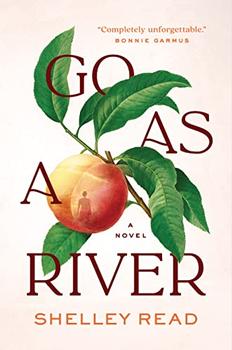Summary | Excerpt | Reviews | Beyond the book | Read-Alikes | Genres & Themes | Author Bio

What binds us to, or makes us flee from, places that ultimately shape our lives? Places where we have loved or betrayed those we love, suffered illness, or endured unfathomable tragedy. In her debut novel In the Garden of Stone, Susan Tekulve writes with rich detail and insight about the power and perils of place and its connection to the human spirit.
Tekulve's story - winner of the South Carolina First Novel Prize - begins in 1924 in War, West Virginia, where Sicilian immigrants have settled to live and work in the coalmines of Appalachia. While 16-year-old Emma Palmisano and her family sleep, a coal car crashes and spills its contents over their house. Emma wakes to a railroad man named Caleb patiently cleaning her injured bare feet. She marries him only a week later, and the couple moves to a house on 47 acres of Virginia mountain farmland.
More than a decade passes and Emma is still haunted by the memory of visiting her family in War with her infant son, Dean. She recalls how her mother, suffering from rheumatism, had chastised her for falling in love too soon and desiring a happier life away from the hardships of the coal camp.
"Sorrow is a privilege," her mother says. "It's how we earn our truths."
For Emma and Caleb, however, sorrow is kept at bay, for a while, at least, when they build an Italian garden on their land: a paradise with stone, water and green. A garden so beautiful, Caleb says, it could "restore the soul better than any church."
As the story evolves we meet Bambino, a vagabond from Sicily who stumbles upon a stroke of good luck by finding work on the railroad with Caleb and his crew. Soon Bambino is injured on the tracks, an event that leads to tragic consequences.
Tekulve's meticulous attention to plants, flowers, wildlife, and even home cooking resonates with integrity and a quiet, refreshing simplicity throughout her saga, which spans almost a half-century. Within these pages there are no cell phones or iPods. Not a single carry-out pizza or boxed frozen dinner. Instead, characters are sustained, even awed, by the silent language of trees, the apple scent of wild white roses, a cow giving birth, the sweat-and-salt taste of country ham, the healing powers of lavender.
Many chapters easily stand alone as self-contained short stories, each of them infused with vivid, sensual scenes that transport the reader to an earlier time. Such as this gem: "Out in the summer kitchen, lemon and pomegranate trees grew in washtubs around a stone table. In the garden beyond, white iris drifted up to the arbor entwined with Confederate jasmine, wild roses, and muscadine, their mingled scents thickening the air, tasting faintly like Maria's dessert wine."
With a large cast of complex characters, Tekulve frequently delves into the anguish of guilt and forgiveness, emotions she captures skillfully by connecting them to the natural world. In one particularly strong passage, Dean, by now a husband and father recalling his past, attempts to numb his crazed mind by wading into an icy creek, "letting the freezing water pierce his ankles, imagining himself under snowy quilts."
Though Tekulve thoughtfully executes a multi-generational tale, its epic intentions sometimes falter, due in part to Emma's fate restricting her character's potential too soon in the story. In some spots, related but distracting storylines tend to hinder cohesion and momentum.
If sorrow is how we earn our truths, then Tekulve's characters gain the privilege of wisdom by experiencing plenty of sadness throughout. Yet there is also tenderness, hope and survival. Overall, Tekulve's patient, absorbing prose is well worth lingering over, contemplating, even savoring until the final page. For fans of Southern fiction, especially, the book will likely be a rewarding read.
In the Garden of Stone is published by Hub City Press, a small non-profit publishing press which publishes literary works by new and established writers with an "emphasis on the Southern experience." It is based in Spartanburg, South Carolina.
![]() This review
first ran in the June 19, 2013
issue of BookBrowse Recommends.
This review
first ran in the June 19, 2013
issue of BookBrowse Recommends.

If you liked In the Garden of Stone, try these:

by Shelley Read
Published 2023
Set amid Colorado's wild beauty, a heartbreaking coming-of-age story of a resilient young woman whose life is changed forever by one chance encounter. A tragic and uplifting novel of love and loss, family and survival—and hope.

by Brad Watson
Published 2017
Astonishing prose brings to life a forgotten woman and a lost world in a strange and bittersweet Southern pastoral.
When a true genius appears in the world, you may know him by this sign...
Click Here to find out who said this, as well as discovering other famous literary quotes!
Your guide toexceptional books
BookBrowse seeks out and recommends the best in contemporary fiction and nonfiction—books that not only engage and entertain but also deepen our understanding of ourselves and the world around us.